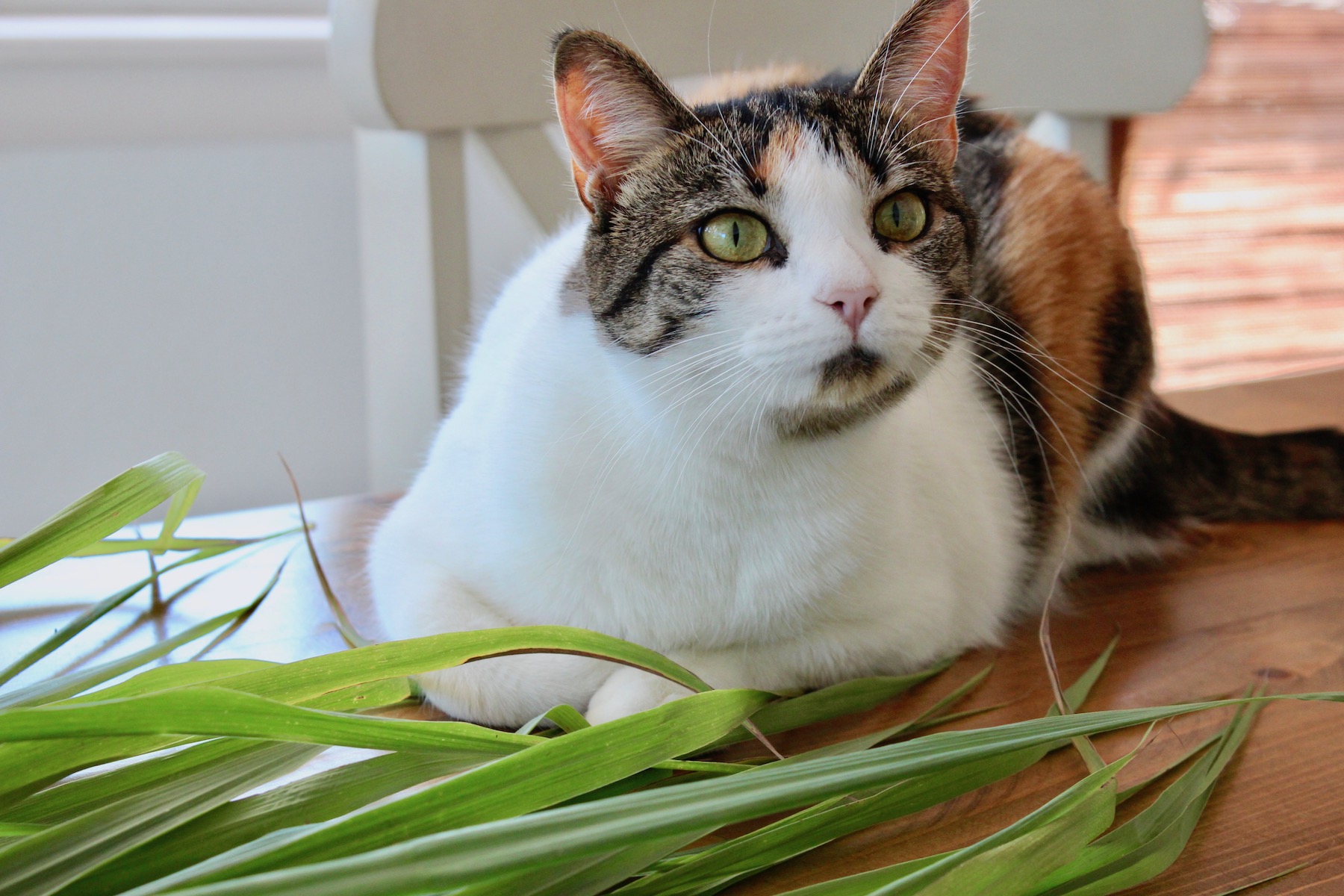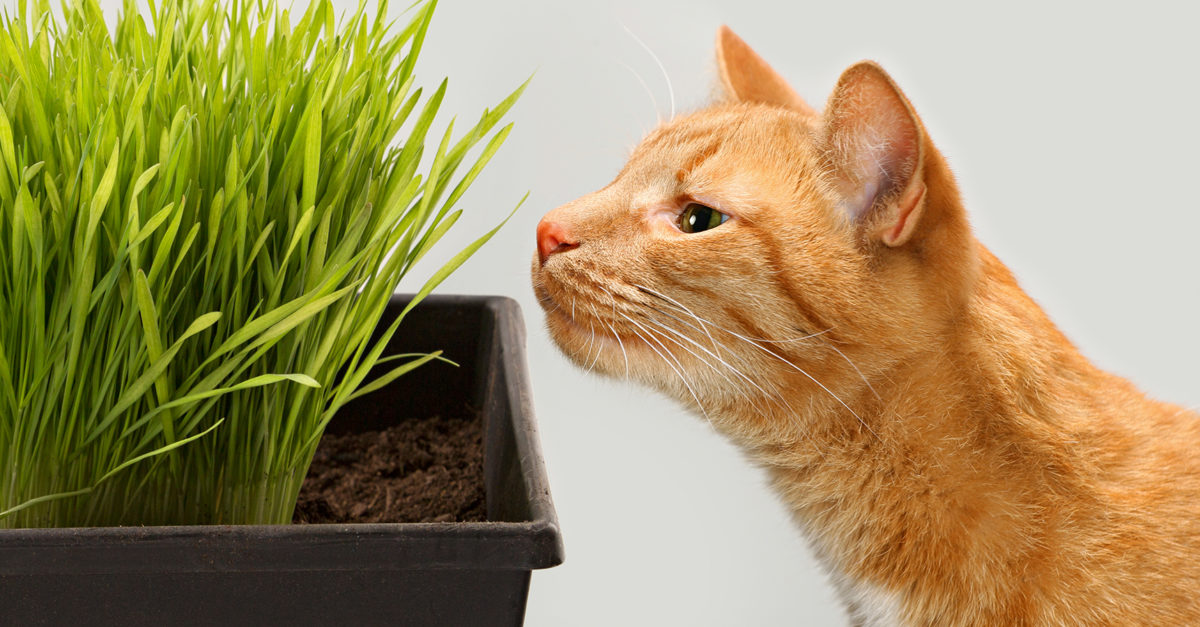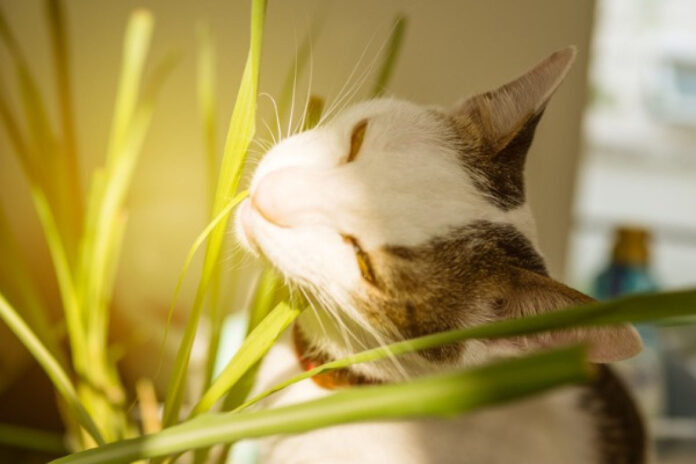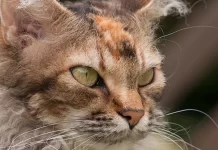Last Updated on March 1, 2024 by Fumipets
Lemongrass and Its Interaction with Cats
For most cats, lemongrass produces a catnip-like effect. A nibble-friendly patch of lemongrass, whether potted inside or grown in an outside garden, is a safe cat treat. Lemongrass essential oil, on the other hand, is poisonous to cats, so keep it out of reach.
The Many Uses Of Lemongrass
Lemongrass refers to a group of over 50 perennial plants belonging to the Cymbopogon genus, which is native to Asia and India.
It’s a popular culinary ingredient with pesticide and preservation properties. It’s typically concentrated as an essential oil in these situations. It repels most insects but attracts bees.
It’s very simple to grow indoors or outdoors, but you may want to restrict your cat’s contact with it during the early phases of plant development.

What is Lemongrass Poisoning?
Cats usually control how much food they consume or nibble, but some cats may not be able to control how much grass they eat, especially lemongrass. A minor GI upset is possible as a result of this. If your cat eats a lot of this grass, he or she is in danger of getting an intestinal obstruction. You may need to limit access to this grass due to how appealing it is to cats.
Cymbopogon citratus, the kind utilised in Thai and Asian cuisine, is one of three types of lemongrass. Cymbopogon winterianus is a close relative of Ceylon citronella, a popular insect repellent. Citronella grass, or Cymbopogon nardus, resembles lemongrass except for its maroon stalks. Citronella oil is produced by this plant, which is slightly poisonous to cats.
Lemongrass, commonly known as oil grass, is a Poaceae family plant. This plant is often used in Thai cuisine, and although it is not poisonous to people, it may be harmful to dogs, cats, and other animals. If your cat eats a little quantity of lemongrass-flavoured baked products, it should be OK.
https://www.youtube.com/watch?v=3K_GW-OUPfs
Symptoms of Lemongrass Poisoning in Cats
You’ll notice the following symptoms when your cat eats lemongrass;
- Gastrointestinal discomfort
- Abdominal pain
- Abdominal distension (swollen abdomen)
- Fever
- Appetite loss.
- Shock
- Strains during defection
- Vomiting
After eating larger amounts:
- Chronic cystitis
- Hind leg weakness
- Urine leakage
- Inability to eliminate body wastes
Lemongrass essential oil, which is concentrated lemongrass essence, may be hazardous to your cat. It lacks the enzymes required to break down the molecules in this essential oil.
If your cat has a strong need for lemongrass, it may be suffering from a nutritional deficit or sickness.

Causes of Lemongrass Poisoning in Cats
Lemongrass isn’t hazardous to cats while it’s alive, as long as they nibble in moderation. Lemongrass, when turned into an essential oil, may be fatal to your cat. Glucuronyl transferase, a liver enzyme that aids in the breakdown of most essential oils, including lemongrass, is absent in all cats.
Diagnosis of Lemongrass Poisoning in Cats
Lemongrass poisoning is diagnosed by following the trail of your cat’s symptoms. He’ll order blood work, a biochemistry profile, a complete blood count, and urinalysis in addition to a thorough physical. The doctor will use these tests to determine whether there are any poisons in your cat’s blood.
Your cat may consume too much lemongrass since it is so appealing to it, putting it in danger of getting an intestinal obstruction. He’ll order X-rays and ultrasound once you tell him what your cat has been consuming. This may involve a barium study, which will make it easier to detect the obstruction.
Once your veterinarian has determined what is wrong with your cat, he will do further tests to rule out pesticide poisoning.

Treatment of Lemongrass Poisoning in Cats
Your veterinarian will provide therapies to aid your cat’s recovery. An IV may be used as part of these therapies, particularly if your cat is in pain.
The vet will manually flush the mass of leaves through your cat’s digestive system if it has developed an intestinal obstruction as a result of the quantity of lemongrass it ate.
If your cat’s obstruction is very severe, the doctor may recommend that the lump be surgically removed. The vet will also heal any harm caused by the lemongrass your cat ate while you’re still asleep.
In instances of essential oil intoxication, your veterinarian will examine your cat’s liver function. This will need to be carefully monitored to ensure that liver damage does not develop. To reduce the chances of this happening, your veterinarian will make your cat vomit, wash out his stomach, and use activated charcoal to absorb any poison left in his body.

Recovery of Lemongrass Poisoning in Cats
Lemongrass toxicity should not be a problem for your cat. Although this plant is only slightly poisonous, your cat may enjoy chewing on its leaves.
While your cat is confined to your home, ensure sure there are no other chances for him to consume lemongrass. Take out all of the lemongrass from your house. Grow cat-friendly grasses inside and out instead. Allow your cat to nibble on these grasses instead of lemongrass with caution.
Take your cat to the doctor for a thorough checkup if it previously had no strong desire to consume lemongrass or other hazardous things but suddenly does. Your cat should be thoroughly checked and tested for anything from vitamin deficits to circulatory problems to brain abnormalities. It should begin eating a more regular diet after the proper therapy for one of these diseases has been provided. Keep an eye on your cat’s behaviour and the surroundings he or she is in. If it starts to nibble on the lemongrass again, give it a little quantity to chew on before moving it to a new location.


















